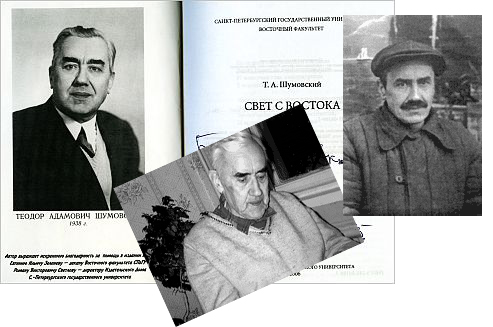On 30 November, the day of St. Andrew, during the cold and windy day, unusual ceremony was held in St. Petersburg – unveiling of monument of outstanding Pole – a scholar, a philosopher, a poet – Theodore Szumowski (1913-2012).
In the book “Poles in St. Petersburg,” published in 2012, it was written that in 2013 we will celebrate the 100th anniversary of the birth of the famous orientalist. However, he died on 28 February 2012 without having seen the anniversary. He passed away after living a century: cruel for him and his family – Poles from Żytomierz, from where they went to Azerbaijan after the outbreak of World War I (Polish people in Azerbaijan honor his name in a special way), where they found a job – his father was an accountant, his mother a music teacher. After a short stay with the family, his mother Amelia came back to Żytomierz to her chronically ill father. Coming back to the family took her 13 years. War homelessness, lack of communication with her loved ones caused that after finding three sons and her husband she passed away due to illness and suffering.
Theodore (also called Todek) spent his childhood on visiting old Azeri cemeteries and trying to read arabesques and inscriptions on tombstones. Older brother, who was musically talented, played on violin, and Todek played guitar and sang Azerbaijani songs. The time passed. Young Szumowski volunteered to work in a coal mine, where he wrote his famous letters to the Orientalists that he knew from the press. He spent many years of scientific work with another outstanding Pole – Orientalist Ignacy Kraczkowski. In 1938, in Leningrad, he was arrested for being a Pole (he kept talking about it publicly) and sent for sabotage with the son of the poet Anna Akhmatova – Lev Gumilev. There was also many years of humiliation and re-exile, the difficulties with the recognition of his scientific achievements of the Soviet period.
Although he had never traveled to Poland (for obvious reasons) and has not had contact with the Polish scientific orientalists, however, he was associated with the home country, its history and culture. He could recite Polish poets for hours, and he begun each day with playing the 1 or 2 Chopin’s Piano Concerto. All day, for the rest of his life, he was engaged in his scientific work. He was repeatedly harassed by some academic societies. He persevered and became an icon for the followers of Islam: Russian Azerbaijanis, Tatars, Kyrgyz. They saved him in the difficult moments of his life. The last decade they really cared about him. They paid for his treatment, orthopedic footwear and any other needs. “Baku” Restaurant send him dinners . For his 95th birthday in hotel “Astoria” there was a party with the city administration. His last favor – to bury Theodore Szumowski on Mostki Literackie next to the monument of his teacher – Ignacy Kraczkowski.
At the grave of Theodore Szumowski ,thanks to the efforts of Azerbaijanis and Tatars living in Petersburg, the monument “Ex Oriente Lux” was erected. Stela in the Muslim tradition is accompanied by arabesque. The monument is proof of gratitude of Muslims for the Pole – a translator of the last book of Koran – into the Russian language.
On 30 November at his grave, on behalf of the General Consul of Poland in St. Petersburg, a bunch of red and white carnations with a ribbon in the Polish national colors was placed.
* (Ignacy Kaczkowski (1883-1951) – orientalist, Arabist, the founder of the Soviet Arabic school. Born in Vilnius, a graduate of the Faculty of Oriental Languages at the University of St. Petersburg).
The full article on Theodore Szumowski will be published soon in St. Petersburg Magazine.
“St. Petersburg Magazine” (Gazeta Petersburska) is a monthly magazine, published since December 1998 by the Adam Mickiewicz Cultural and Educational Association “Polonia” in St. Petersburg. It is published in two languages – Polish and Russian, in both – printed and e- versions.
The Editorial Team consist of multigenerational group of people working together for 14 years and very well combining experience, knowledge, respect for tradition with a modern, web-form media. The whole team knows the Polish language and actively takes part in the promotion of Polish culture, tradition, language and events in St. Petersburg.
In “St. Petersburg Magazine” you can read not only current news and information about different events, but also many interesting articles and interviews with Poles living in Russia and other countries.



